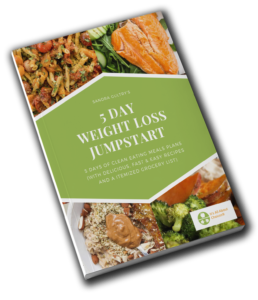High cholesterol increases your risk of heart disease and heart attacks.
Medications can help improve your cholesterol.
Most of us would rather avoid medications and first make lifestyle changes to improve cholesterol levels.
In this third week of my “Fall in Love with your HEART Series”
Read as I give the top five (5) lifestyle changes that will improve your cholesterol, heart health and weight.
Lifestyle Change #1: Eat Heart-Healthy Foods
A few changes in your diet can reduce cholesterol and improve your heart health:
- Reduce saturated fats. Saturated fats, found primarily in red meat and full-fat dairy products, raise your total cholesterol. Decreasing your consumption of saturated fats can reduce your low-density lipoprotein (LDL) cholesterol — the “bad” cholesterol.
- Eliminate trans fats. Trans fats, sometimes listed on food labels as “partially hydrogenated vegetable oil,” are often used in margarines and store-bought cookies, crackers and cakes. Trans fats raise overall cholesterol levels.
- Eat foods rich in omega-3 fatty acids.Omega-3 fatty acids don’t affect LDL cholesterol. But they have other heart-healthy benefits, including reducing blood pressure. Foods with omega-3 fatty acids include wild caught salmon, mackerel, herring, walnuts and flaxseeds.
- Increase soluble fiber. Soluble fiber can reduce the absorption of cholesterol into your bloodstream. Soluble fiber is found in such foods as oatmeal, kidney beans, Brussels sprouts, apples and pears.
- Add whey protein. Whey protein, which is found in low-fat/FF dairy products, may account for many of the health benefits attributed to dairy. Studies have shown that whey protein given as a supplement lowers both LDL cholesterol and total cholesterol as well as blood pressure.
Lifestyle Change #2: Exercise Most Days of the Week
Exercise is directly related to improving cholesterol. Moderate physical activity can help raise high-density lipoprotein (HDL) cholesterol, the “good” cholesterol.
With your doctor’s OK, work up to at least 30 minutes of exercise five times a week or vigorous aerobic activity for 20 minutes three times a week.
Adding physical activity, even in short intervals (10 minute bouts) several times a day, can help you begin to lose weight. Consider:
- Taking a brisk daily walk during your lunch hour (aim for 15 minute/mile)
- Riding your bike to work
- Playing a favorite sport
To stay motivated and accountable, consider finding an exercise buddy or joining an exercise group.
Lifestyle Change #3: Quit Smoking
Quitting smoking improves your HDL (good) cholesterol level. The benefits occur quickly: (This is pretty impactful)
- Within 20 minutes of quitting, your blood pressure and heart rate recover from the cigarette-induced spike
- Within three months of quitting, your blood circulation and lung function begin to improve
- Within a year of quitting, your risk of heart disease is half that of a smoker
These are some good stats to share with someone you know is a smoker.
Lifestyle Change #4: Lose Weight
Carrying even a few extra pounds contributes to high cholesterol. Small changes add up. Surprising the difference losing 5% of current body weight will do for heart health.
If you drink sugary beverages, switch to tap water. Snack on whole foods such as air-popped popcorn or pretzels — but keep track of the calories.
If you crave something sweet, try sherbet or frozen fruit like cherry’s, mango, grapes are good at keep sugar cravings at bay. Don’t forget last week’s topic DARK CHOCOLATE!
Key is eating balance and adequate enough to promote 1 to 1 ½ lb loss per week AND improve cholesterol AND lower blood pressure AND manage blood sugar.
I do this all the time with my clients, so I know its possible!
Lifestyle Change #4: Drink Alcohol in Moderation
Moderate use of alcohol has been linked with higher levels of HDL (good) cholesterol — but the benefits aren’t strong enough to recommend alcohol for anyone who doesn’t already drink.
If you drink alcohol, do so in moderation. For healthy adults, that means up to one drink a day for women of all ages and men older than age 65, and up to two drinks a day for men age 65 and younger.
A drink is defined as 4 oz wine 1 oz liquor, 12 FL beer. The drinks don’t cue up for the weekend. Its like some people’s vacation, if you don’t use it you lose!
Too much alcohol can lead to serious health problems, including high blood pressure, heart failure and strokes.
Sandra Recommends
Do you feel like you’ve tried every diet created?
After trying many diets you’re likely left feeling frustrated and disappointed because you can’t keep the weight off for good.
It can be incredibly tiresome to always feel like you’re starting over without any real change in your body.
If you’re struggling with weight loss or confused/overwhelmed about what to eat…
I’ve got you covered!
That’s why I created this 5-Day meal plan. In this easy-to-follow guide, you’ll experience:
- Surge of energy levels throughout the day (think 2-4pm typically crash n burn)
- Benefits of eating satisfying meals that will keep cravings at bay
- Waking up feeling refreshed, energized, and ready to take on the day
An added bonus is you will “Jump start Your Weight Loss & Boost Your Energy Levels”!
Click [HERE] to grab your free copy!
Another Sandra Recommends
Listen to the FB LIVE Replay for more insightful information on this BLOG.



